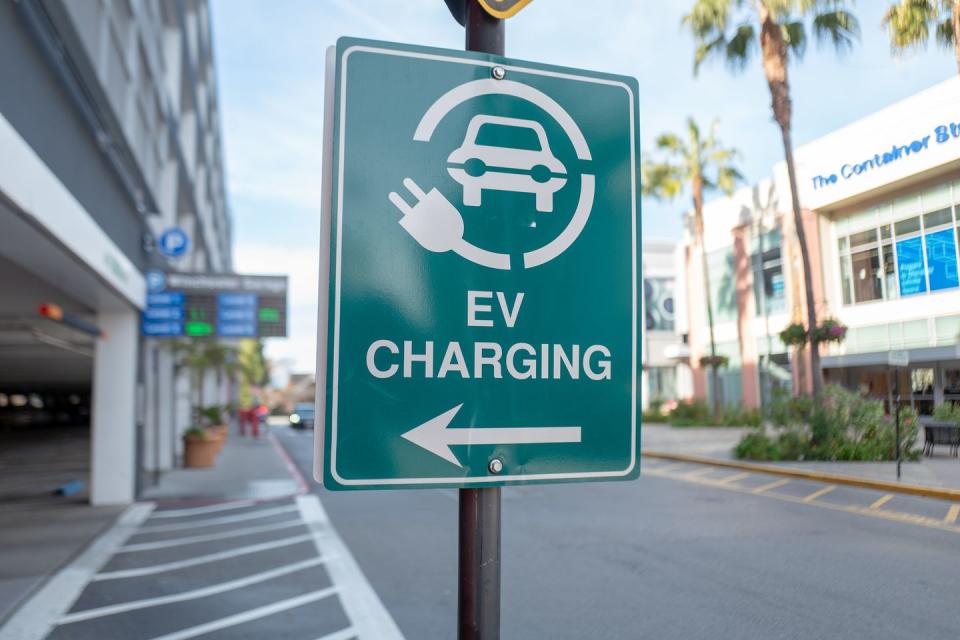Biden's $2.3 Trillion Infrastructure Plan Leans Heavily on EVs
Officially known as the American Jobs Plan, President Biden's plan includes $174 billion to promote electric vehicles and EV charging stations, $80 billion for public transit, and another $80 billion for railroads.
Construction and upkeep for traditional infrastructure items—highways, bridges, and roads, for example—get $115 billion in the proposal.
EV fans are unsurprisingly excited, calling this a "down payment on the future of transportation," and expect private investment to follow federal dollars.
There are a lot of things packed into President Biden's $2.3 trillion infrastructure proposal, but before we get to any "the sky is falling" worries, it's worth noting one important item that isn't in the American Jobs Plan: a ban on gas-powered vehicles.
Biden's forward-looking plan certainly includes a lot of money to promote electric vehicles, but it does not set an end date on when gas vehicles will be sold in the U.S. In that way, it's different than some state and local laws (or attempts) to put limits on the sale of gas-powered cars, like Massachusetts and California. Despite the lack of a ban, the plan is meant to take a huge bite out of the American contribution to global warming. The reason for the bill's focus on EVs is not exactly secret: Secretary of Transportation Pete Buttigieg told NPR this week that the administration believes "time is running out" to confront climate change, and this bill is one way the federal government is approaching the challenge.
When we look at the $620 billion in transportation spending that's included in the plan, as the Wall Street Journal did, it's clear that electric vehicles will benefit the most thanks to $174 billion in spending, including incentives to buy EVs and support to get more EV chargers installed across the country: 500,000 of them by 2030.
The old-school definition of infrastructure—your basic bridge, highway, and road package—is included in the American Jobs Plan, just not as the top-level priority. They're in second place in the transportation category with $115 billion. There is also $80 billion intended for public transit, $80 billion for passenger and freight trains, $25 billion for airports, and $20 billion for road safety. Other features of the bill include replacing lead water pipes, workforce development, and $213 billion for affordable housing.

The $174 billion in support of electric vehicles is getting the most attention from connected players in the auto industry, of course.
"To fully understand the investment in electric transportation that the President is proposing, we need to appreciate the vast scope of the challenge," Joel Levin, executive director of EV advocacy group Plug In America, said in a statement. "This federal investment of $174 billion is really intended to activate all of the private human and financial capital that will be needed and is just a fraction of the real cost for this transformation. This is a down payment on the future of transportation."
Pasquale Romano, president and CEO of EV charging station operator ChargePoint, said the government money will stimulate private sector investment in EV charging infrastructure throughout the U.S.
"We encourage Congress to pass legislation that supports the proposed plan and includes rebates to businesses that will accelerate the installation of charging infrastructure for multifamily homes and workplaces," he said in a statement, adding that Congress should expand tax credits to support fleet electrification and fund charging infrastructure on U.S. highways.
Spending $2.3 trillion on infrastructure might seems like—okay, is—a lot of money, but even this number isn't enough for some. The $80 billion for public transit and the $80 billion for railroads, for example, are what the environmental organization Climate Nexus calls a good start.
"$1 trillion in rail investments is needed to meet President Biden's goal to 'spark the second great railroad revolution,' and Secretary Buttigieg's goal to make the United States a world leader in high-speed rail," said Climate Nexus's Marcela Miceli in a statement.
Perhaps Congress will listen as it makes changes to Biden's proposal before passing it into law.
You Might Also Like

 Yahoo Autos
Yahoo Autos 